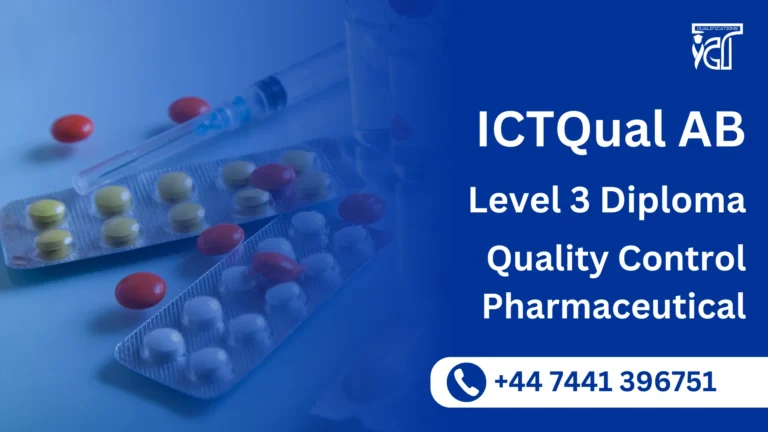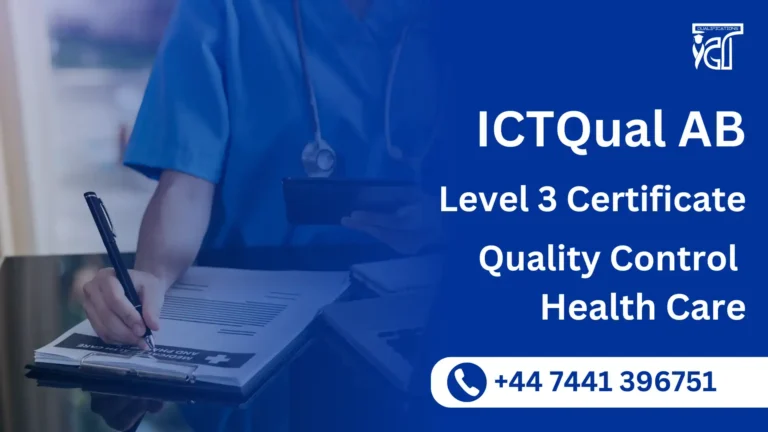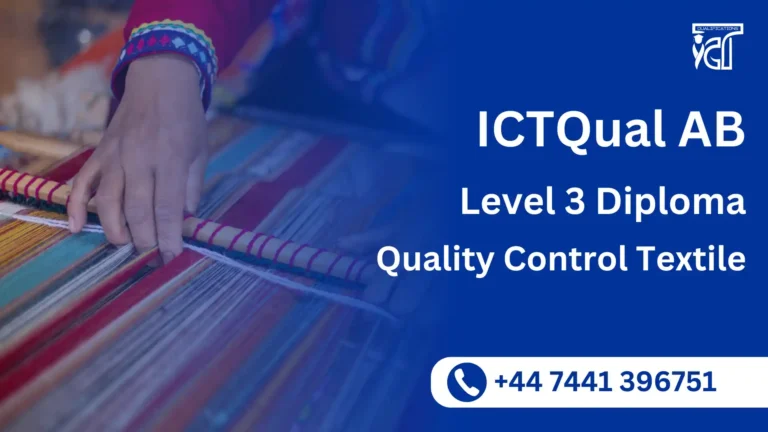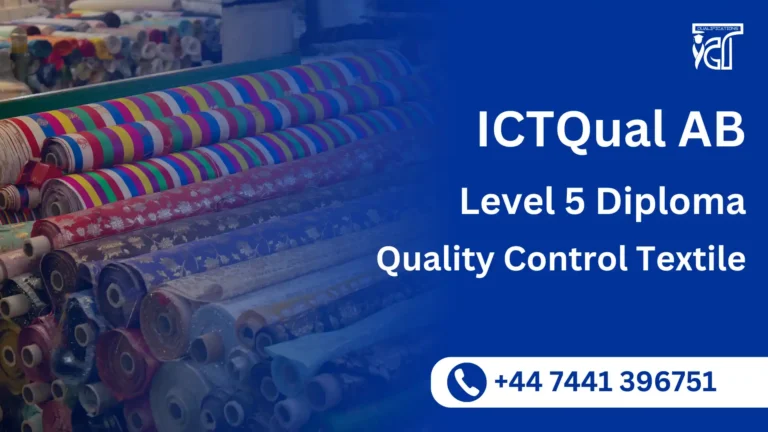The ICTQual AB Certified Quality Manager qualification is a high-level certification designed for experienced professionals committed to mastering quality leadership within complex organizational environments. It bridges foundational quality methodologies with strategic management skills essential for steering quality systems across both manufacturing and service sectors. Learners gain the proficiency needed to implement Total Quality Management (TQM), enhance systems performance, and lead sustainable improvement initiatives on a global scale.
The curriculum emphasizes advanced topics such as quality systems design, organizational performance metrics, strategic decision-making, and innovation in quality processes. Core modules include developing and auditing ISO‑based standards, leadership for quality excellence, and applying lean and Six Sigma methodologies. Through real-world case studies, research-led assignments, and portfolio-driven evidence, participants will build strategic thinking and systems-oriented skills needed for senior quality roles.
Upon completion, graduates are well-equipped for leadership positions such as Quality Systems Manager, Head of Quality Assurance, Compliance Director, or Organizational Excellence Consultant across industries like manufacturing, healthcare, education, and finance. The qualification is recognized internationally and often considered equivalent to senior professional awards. It enhances credibility, supports organizational change, and opens doors to advisory or consultancy-level career advancement.
ICTQual AB Certified Quality Manager
This qualification, the ICTQual AB Certified Quality Manager, consists of 8 mandatory units.
- Principles and Practices of Quality Management
- Quality Standards and Compliance
- Strategic Quality Leadership
- Quality Tools and Techniques
- Risk- Based Thinking and Decision-Making
- Supplier and Customer Relationship Management
- Quality Project and Change Management
- Performance Measurment and Continuous Improvement
Learning Outcomes for the Study Units:
1. Principles and Practices of Quality Management
- Understand the core concepts and historical evolution of quality management.
- Apply the principles of Total Quality Management (TQM) and quality philosophies (e.g., Deming, Juran, Crosby).
- Analyze the role of quality in enhancing organizational performance and stakeholder satisfaction.
2. Quality Standards and Compliance
- Interpret and apply key international standards such as ISO 9001, ISO 14001, and ISO 45001.
- Ensure organizational alignment with regulatory and industry-specific quality requirements.
- Prepare for and participate in audits to demonstrate compliance and system effectiveness.
3. Strategic Quality Leadership
- Lead and embed a quality-driven culture across all levels of an organization.
- Align quality objectives with business strategy to drive competitive advantage.
- Develop leadership and communication skills to influence quality outcomes.
4. Quality Tools and Techniques
- Utilize core quality tools such as Pareto Charts, Fishbone Diagrams, Control Charts, and FMEA.
- Apply problem-solving frameworks including PDCA, 5 Whys, and Root Cause Analysis (RCA).
- Measure, analyze, and improve process capability and product quality.
5. Risk-Based Thinking and Decision-Making
- Integrate risk-based approaches into planning and operational processes.
- Conduct risk identification, analysis, and mitigation using structured methodologies.
- Make data-driven decisions to prevent non-conformities and optimize quality performance.
6. Supplier and Customer Relationship Management
- Evaluate and manage supplier performance through defined quality criteria and KPIs.
- Foster effective communication and collaboration within the supply chain.
- Enhance customer satisfaction and loyalty through quality-focused service delivery.
7. Quality Project and Change Management
- Plan and manage quality improvement projects using structured methodologies (e.g., DMAIC, Lean).
- Apply change management principles to drive sustainable quality enhancements.
- Monitor project effectiveness through milestone tracking and stakeholder engagement.
8. Performance Measurement and Continuous Improvement
- Develop and implement performance metrics aligned with quality goals.
- Conduct regular reviews and audits to identify improvement opportunities.
- Promote a culture of Kaizen and continuous improvement (CI) across functions.
The ICTQual AB Certified Quality Manager program offers significant strategic, operational, and leadership-level advantages for professionals looking to lead quality transformation across organizations. This advanced certification empowers individuals with the tools and insight needed to manage end-to-end quality systems, enhance business performance, and foster a culture of continuous improvement. The key benefits include:
- Strategic Quality Leadership Skills
Develop the ability to lead quality initiatives across enterprise-wide functions and align quality objectives with organizational goals. - Mastery of Global Standards
Gain expert-level understanding of international standards such as ISO 9001, ISO 14001, and ISO 45001, preparing you to design, audit, and maintain integrated quality management systems. - Total Quality Management (TQM) Proficiency
Learn how to implement and oversee comprehensive TQM frameworks that enhance operational efficiency, customer satisfaction, and process excellence. - Enhanced Decision-Making Abilities
Build analytical skills in performance metrics, risk-based thinking, and root cause analysis to support informed, data-driven management decisions. - Advanced Process Improvement Techniques
Apply Lean, Six Sigma, and Kaizen methodologies to optimize workflows, eliminate waste, and reduce variation in processes across various sectors. - International Recognition and Career Advancement
Attain a globally respected qualification that opens doors to high-level roles such as Quality Director, Compliance Manager, or Operational Excellence Consultant. - Organizational Change Capability
Learn how to lead quality-related change management initiatives that foster innovation, compliance, and long-term competitiveness. - Expanded Professional Network
Join a community of quality professionals and gain access to collaborative opportunities, benchmarking insights, and leadership forums. - Improved Earning Potential
With a senior-level certification, significantly increase your chances of earning higher salaries and advancing to executive-level roles. - Eligibility for Further Professional Certifications
Use this diploma as a foundation for advancing into quality consultancy, auditing, or even ISO Lead Auditor qualifications and postgraduate-level programs.
The ICTQual AB Certified Quality Manager program is designed for experienced professionals who are ready to take on strategic leadership roles in quality management across manufacturing, services, or public sector organizations. This program is ideal for those who already possess a strong foundation in quality assurance or operational excellence and are looking to formalize their expertise with an internationally recognized qualification. The ideal learners for this course include:
- Mid-to-Senior Quality Professionals
Individuals already working in quality control, quality assurance, or compliance who are seeking career progression into managerial or executive roles. - Quality System Auditors and Compliance Officers
Professionals involved in internal or external auditing of ISO-based management systems who want to strengthen their leadership and systems-thinking skills. - Operations and Production Managers
Managers overseeing manufacturing, logistics, or service delivery processes who want to lead performance improvements through quality frameworks. - Process Improvement and Six Sigma Practitioners
Lean, Six Sigma, or Kaizen-certified professionals looking to complement their technical skillset with strategic quality leadership competencies. - Consultants and Trainers in Quality Management
Professionals who provide quality advisory, training, or system implementation services and want to validate their knowledge with a formal, globally respected diploma. - Entrepreneurs and Business Owners
Individuals running or managing small to medium enterprises who want to embed quality management practices into their organizational culture and operations. - Postgraduate or Degree Holders in Engineering/Management
Those who hold academic qualifications and want to specialize in quality leadership to increase their industry relevance and employability. - Professionals Seeking International Recognition
Candidates working in multinational environments or aiming for global roles who need a certification aligned with international quality standards. - Change Agents and Project Leaders
Individuals tasked with leading change, innovation, or transformation projects who require structured quality strategies to support organizational development. - Lifelong Learners and Aspiring Quality Leaders
Motivated professionals who are passionate about delivering excellence, improving systems, and leading high-impact quality initiatives.
Entry Requirements
Register Now
Qualification Process
Qualification Process for the ICTQual AB Certified Quality Manager
- Self-Assessment:
Begin by evaluating your eligibility to ensure you meet the qualification requirements, including work experience, knowledge, and language proficiency. - Registration:
Complete your registration by submitting the required documents, including a scanned copy of a valid ID, and paying the registration fee. - Induction:
An assessor will conduct an induction to confirm your eligibility for the course and explain the evidence requirements. If you do not meet the criteria, your registration will be canceled, and the fee will be refunded. - Assignmnets & Evidence Submission:
Provide all assignmnets and the necessary evidence based on the assessment criteria outlined in the course. If you are unsure of the required evidence, consult with the assessor for guidance on the type and nature of evidence needed. - Feedback and Revision:
The assessor will review your submitted evidence and provide feedback. Evidence that meets the criteria will be marked as “Criteria Met,” while any gaps will be identified. You will be asked to revise and resubmit if needed. - Competence Evidence:
Submit final evidence demonstrating that all learning outcomes have been met. This evidence will be marked as “Criteria Met” by the assessor once it is satisfactory. - Internal Quality Assurance (IQA):
The Internal Quality Assurance Verifier (IQA) will review your evidence to ensure consistency, quality, and compliance with standards. - External Verification:
The IQA will submit your portfolio to ICTQUAL AB External Quality Assurance Verifiers (EQA) for final confirmation. The EQA may contact you directly to verify the authenticity of your evidence. - Certification:
Upon successful completion of all checks, ICTQUAL AB will issue your official certificate, confirming that you have attained the ICTQual AB Certified Quality Manager.







